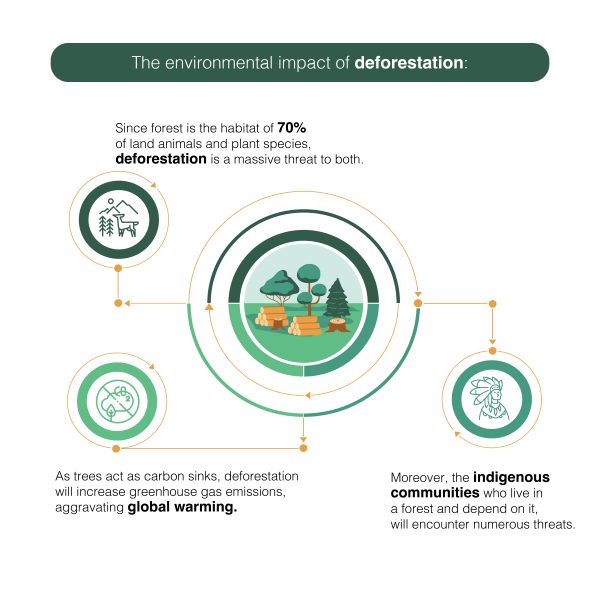“Deforestation is changing our climate, harming people and the natural world. We must, and can reverse this trend.” –
Jane Goodall, renowned English primatologist and anthropologist.

Deforestation and forest degradation worsen the climate crisis, leaving the planet with no means to restore its overall health. As we all know, deforestation releases carbon dioxide and greenhouse gases, which worsens global warming. Therefore, the best path to reduce global warming and restore the health of our planet is eradicating deforestation and saving the environment.
The EU Deforestation Regulation, in effect since June 29, 2023, is designed to limit deforestation and forest degradation and save the indigenous people and local communities. This regulation deals with seven commodities and their derived products: cattle, cocoa, coffee, oil palm, soya, wood, and rubber. According to the EUDR, companies intending to place products in the EU market or EU-based companies looking to export their goods must demonstrate that they are deforestation-free, produced in compliance with relevant local legislation, and supported by a due diligence statement.

The role of large-scale agriculture
Large-scale agriculture plays a significant role in deforestation, with cattle ranching and soybean plantations serving as prominent drivers. This issue didn’t emerge overnight; instead, it has been steadily and persistently advancing with each passing year. The Amazon, known as the lungs of our planet, is being affected by large-scale cattle ranching as forests are being converted into grazing lands, disrupting the biodiversity and ecosystem. As beef has a massive demand worldwide, The Amazon’s lush forest has been disrupted to create cattle pastures. This has grave ecological consequences, more than it sounds, causing habitat loss of many species.
Business accountability and impact
Deforestation leads to significant environmental issues, including climate change, biodiversity loss, and habitat destruction. Nevertheless, companies can gain valuable insights by monitoring their supply chains, thereby reducing the likelihood of deforestation and forest degradation within their supply chain. Furthermore, unlike in the past, consumers are aware of the environmental impact of the products they purchase and are interested in products that don’t harm the environment.
In the wake of climate change, regulation bodies worldwide are mandating stricter environmental regulations, and companies refusing to comply with those regulations will have to encounter public backlash and legal consequences. Supply chains linked to deforestation are prone to face the risk of losing their reputation. Examining the supply chains to determine whether it’s linked to deforestation can help achieve sustainability goals, gaining transparency and managing risks.
The EU's position and global influence
The EU, undoubtedly, is the largest single market globally for goods and services. Being a vast market, it brings an immense demand for various products, namely agricultural commodities, food, timber, and other goods linked to deforestation. Thereby, the EU’s consumption habits significantly impact the global supply chains of these products. And what’s more, the EU has been the major consumer of products causing deforestation, including soy, beef, palm oil, cocoa, and whatnot. These products, when not sustainably produced, become significant contributors to deforestation. The fact remains that the high demand for these products in the EU market has, in various ways, driven deforestation worldwide.
The official adoption and implementation of the EU Deforestation Regulation (EUDR) occurred on June 29, 2023. Businesses will have until December 30, 2024, to comply.
Competent authorities from member states will utilise a risk-based approach when conducting checks within their borders, considering factors such as the relevant commodities, supply chain complexity and length, producing nation, and non-compliance history of enterprises. Customs officials will review due diligence declarations before allowing the export or distribution of relevant products on the European market. The Commission will eventually set up an information system and an electronic data transmission interface to make declarations easier.
How traceability aids in compliance with the EUDR
With a traceability system, companies can monitor their supply chain and prove the sustainability and legality of their products, as it is vital to comply with the EUDR. Companies should perform due diligence to ensure their products don’t cause deforestation or forest degradation. Traceability, which promotes transparency, also enables consumers to make informed decisions.
Conclusion
To put it briefly, companies wishing to sustain in the EU market must adhere to the EUDR, as non-compliance will lead to public backlash, loss of reputation and legal penalties. Consumers have been changed a lot as they mostly prefer the products which are produced sustainably.
Our Supply Chain Traceability and ESG Intelligence suite leverages satellite imaging and remote sensing technology to track deforestation actively. We integrate data from reputable sources like Copernicus Sentinel-2, Landsat, and GEDI, complemented by LiDAR and Radar, to create predictive models for preemptive risk management, incorporating an extensive compliance database for timber trading, facilitating effortless verification of necessary documentation at various points in the supply chain to ensure compliance with legal mandates.
